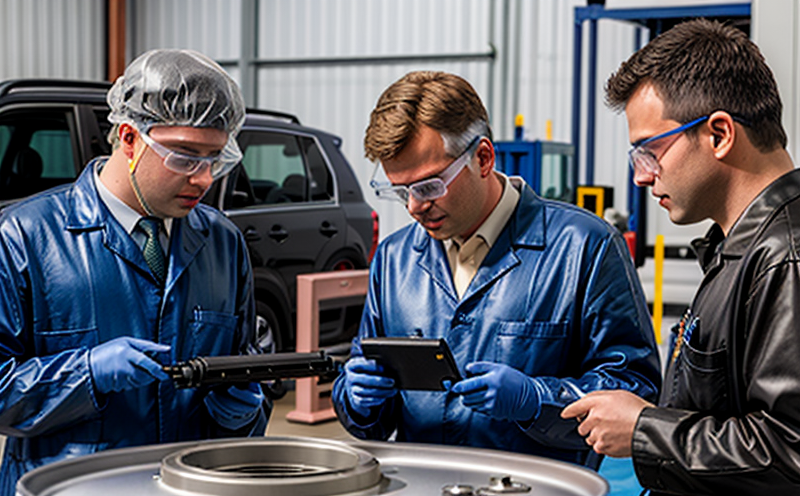Testing the compatibility of materials used in the automotive, aerospace, and medical industries with chemicals
The Crucial Role of Material Compatibility Testing in Ensuring Industry Safety and Efficiency
In the fast-paced world of automotive, aerospace, and medical manufacturing, ensuring the safety and reliability of materials is paramount. With the increasing complexity of modern products and systems, its becoming more challenging to guarantee that materials used will perform optimally under various environmental conditions. Thats where material compatibility testing comes into play a critical laboratory service offered by Eurolab.
What is Material Compatibility Testing?
Material compatibility testing involves evaluating how different materials react with chemicals, environmental factors, and other substances that they may come into contact with during their lifecycle. This type of testing helps manufacturers identify potential issues before they become major problems, ensuring the integrity and performance of their products.
In the automotive industry, for instance, engine components are exposed to various fuels, lubricants, and cleaning agents, which can affect their durability and safety. Similarly, in aerospace, materials must withstand extreme temperatures, corrosive environments, and other harsh conditions that could compromise their structural integrity. In the medical sector, implantable devices and equipment must be resistant to bodily fluids, disinfectants, and sterilization processes.
Why is Material Compatibility Testing Essential?
Material compatibility testing is crucial for several reasons
Ensures product safety By identifying potential material-chemical interactions, manufacturers can prevent catastrophic failures, recalls, and even fatalities.
Reduces maintenance costs Compatible materials minimize the need for frequent replacements or repairs, saving companies a significant amount of money in the long run.
Improves performance Materials that are compatible with chemicals perform better, resulting in increased efficiency, longer lifespans, and enhanced overall product value.
Enhances customer satisfaction Products made from materials proven to be compatible with chemicals meet or exceed regulatory standards, fostering trust among customers.
Benefits of Partnering with Eurolab
Our laboratory services are specifically designed to cater to the unique needs of automotive, aerospace, and medical industries. By choosing Eurolab for material compatibility testing, you can expect
Expertise Our team consists of experienced professionals with in-depth knowledge of industry-specific regulations, materials science, and chemical analysis.
State-of-the-art facilities We operate modern, well-equipped laboratories that provide precise and reliable results.
Comprehensive testing protocols Eurolabs standardized procedures ensure that all samples are tested using the most relevant and up-to-date methods.
Rapid turnaround times We strive to deliver timely results without compromising on quality or accuracy.
Key Benefits of Material Compatibility Testing
Material compatibility testing offers numerous benefits, including
Risk reduction Identifying potential material-chemical interactions enables manufacturers to mitigate risks associated with product failure.
Compliance with regulations By demonstrating compliance with industry standards and regulations, companies can avoid costly fines, penalties, or even legal action.
Increased efficiency Compatible materials streamline production processes, reduce waste, and minimize the need for rework.
Product innovation Material compatibility testing facilitates the development of new products and technologies by allowing manufacturers to explore novel material combinations.
QA Frequently Asked Questions About Material Compatibility Testing
What types of materials can be tested for compatibility?
Metals (aluminum, steel, titanium)
Polymers (plastics, composites)
Ceramics
Glass
Coatings and surface treatments
Which chemicals are commonly tested for material compatibility?
Fuels (gasoline, diesel, jet fuel)
Lubricants (engine oil, hydraulic fluid)
Cleaning agents (solvents, detergents)
Corrosion inhibitors
Biocides and disinfectants
What types of testing are used to assess material compatibility?
Immersion tests
Vibration tests
Thermal cycling tests
Creep testing
Fatigue testing
Conclusion
Material compatibility testing is an indispensable tool for ensuring the safety, reliability, and performance of products in the automotive, aerospace, and medical industries. By partnering with Eurolab, manufacturers can tap into our expertise, state-of-the-art facilities, and comprehensive testing protocols to minimize risks, improve efficiency, and enhance customer satisfaction.
-
Testing chemical resistance of materials in various industrial environments
-
Evaluating how different materials react when exposed to specific chemicals
-
Assessing the long-term compatibility of materials with various chemical substances
-
Determining how chemicals affect the physical properties of metals, plastics, and ceramics
-
Simulating material failure under different chemical exposures in manufacturing processes
-
Evaluating the impact of chemical exposure on material integrity in harsh environments
-
Ensuring that chemical formulations do not compromise the strength or performance of materials
-
Assessing compatibility with materials used in packaging, coatings, and containers
-
Testing the impact of aggressive chemicals on seals, gaskets, and other critical components
-
Evaluating the interaction between different chemicals and materials used in consumer products
-
Testing the effect of chemical exposure on elastomers and rubber materials
-
Assessing the compatibility of composite materials with aggressive chemicals used in industrial applications
-
Ensuring that chemicals do not cause degradation or corrosion of equipment, pipelines, or tanks
-
Simulating different chemical exposure scenarios to determine material suitability and durability
-
Testing materials for compatibility with chemicals at different temperatures, pressures, and conditions
-
Evaluating chemical interactions between two or more substances and their effect on material properties
-
Determining the best material choices for applications involving aggressive chemical environments
-
Testing the effects of chemical exposure on surface finishes, including coatings and plating
-
Ensuring the safe use of chemicals in consumer goods by testing material compatibility for health and safety
-
Evaluating the stability of materials over time when exposed to chemicals in manufacturing and storage
-
Determining the performance of coatings and films when exposed to various chemicals used in industrial processes




